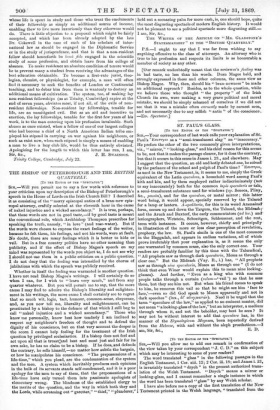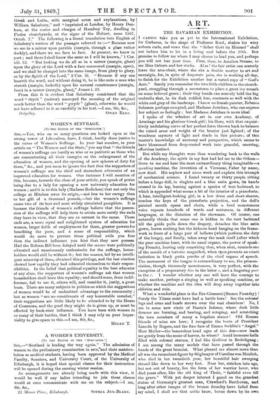(TO THE EDITOR OF THE "SPECTATOR. ") SIR, —Will you allow me
to add one remark in confirmation of the view taken by your correspondent "J. C. D." on this aubjecb which may be interesting to some of your readers?
The word translated " glass " in the following passages in the English Testament, 1 Cor. xiii. 12; 2 Cor. iii. 18; and James i. 23, is invariably translated " drych " in the present authorized trans- lation of the Welsh Testament. " Drych " means a mirror or looking-glass, and I cannot remember a single instance in which the word has been translated "glass" by any Welsh scholar.
I have also before me a copy of the first translation of the New. Testament printed in the Welsh language, " translated from the
Greek and Latin, with marginal notes and explanations, by William Salesbury," and "imprinted at London, by Henry Den- ham, at the costes and charges of Humfrey Toy, dwelling in Paules churchyarde, at the signe of the Helmet, anno 1567, °doh. 7." The following is a literal translation into English of Salesbury's version of the passages referred to :—" Because now we see in a mirror upon parable (margin, through a glass rather darkly), and there we see face to face. At present, we know in part ; and there I shall know the same as I will be known," 1 Cor. xiii. 12. " But looking we do all as in a mirror (margin, glass) upon the glory of the Lord with a face uncovered (margin, open), and we shall be changed into the same image, from glory to glory, as by the Spirit of the Lord," 2 Cor. iii. " Because if any one heareth the word, and without doing it, he is like unto a man who stareth (margin, looketh) upon his natural countenance (margin, face) in a mirror (margin, glass)," James i. 23.
From this it is evident that Salesbury considered that the word " drych " (mirror) conveyed the meaning of the original much better than the word " gwydr " (glass), otherwise he would not have adhered to it so carefully in his text. —I am, Sir, &c.,































 Previous page
Previous page